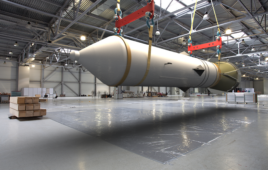Aerospace giant Boeing Co. saw its earnings plunge by a third in the second quarter because of repeated delays with a military fuel tanker.
The Chicago-based company on Wednesday posted a $1.11 billion net profit, down from $1.65 billion during the same period last year.
The bulk of that drop is attributed to a $536 million after-tax charge Boeing took on the Air Force’s KC-46 Pegasus Tanker, a midair refueling plane Boeing is building off its commercial 767 jet frame. The company said it has faced higher engineering and manufacturing costs to complete certification and initial production of the military aircraft.
“While last week’s tanker charge announcement was disappointing, we realize that unexpected issues can arise during the design and development of large, complicated products,” said Edward Jones analyst Jeff Windau. “The key issue is that the delivery schedule be maintained.”
To date, Boeing has booked $1.26 billion in charges related to the tanker project, according to Wolfe Research.
The airplane builder posted revenue of $24.54 billion in the period, up 11 percent from the same period last year. The profit worked out to $1.59 a share, down from $2.24 during the same period last year.
That increased revenue mostly came from faster production of its commercial planes. Boeing takes a deposit when a jet order is made but doesn’t collect the bulk of the cash until a jet is delivered. The company delivered 197 commercial jets during the quarter, up from 181 during the same period last year.
“Record commercial airplane deliveries to customers worldwide drove solid revenue growth,” the company’s new CEO, Dennis Muilenburg said in a statement.”
Tuesday night, right before Wednesday’s earnings release, Boeing did announce some good news: FedEx is ordering 50 new 767 cargo freighters with the option to purchase more.
The 767 is nearing the end of its production cycle, replaced by the more fuel-efficient 787, also known as the Dreamliner. Before this order, there were only 39 of them ordered but not delivered. That does not include the KC-46 tankers which use the same body but with major design modifications. They both share the same assembly line at Boeing’s Everett, Washington, factory.
Boeing is producing the jet at the sloth-like rate of 1.5 new planes a month. The 737, its most popular model, has a production rate of 41.5 new jets a month.
Boeing also lowered its full-year earnings outlook to a range of $7.70 to $7.90 per share, down from $8.10 to $8.30 a share.
Boeing shares have climbed 12 percent since the beginning of the year, while the Standard & Poor’s 500 index has climbed almost 3 percent. The stock has increased 9.5 percent in the last 12 months.
Filed Under: Aerospace + defense




